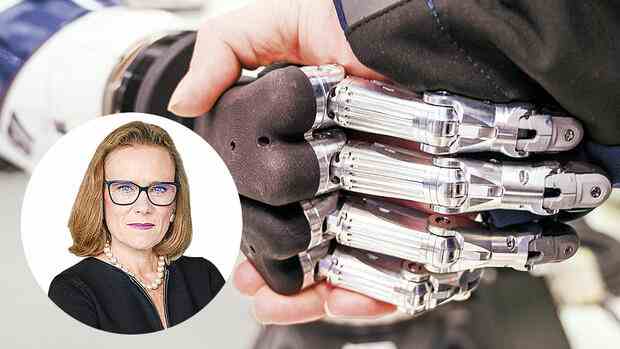Belén Garijo is President and CEO of Merck.
(Photo: dpa (2))
For three centuries, since the invention of the steam engine, Europe has led successive waves of innovation, laying the foundation for our prosperity today. We are currently experiencing how artificial intelligence (AI), nanotechnology and biotechnology are increasingly merging, disrupting existing markets and creating new ones.
This wave of innovation differs significantly from previous waves. We call this new megatrend bioconvergence. Here, it is not a single technology that characterizes the change, but the interaction or convergence of different technologies – and thus enables unique market innovations.
The biological, physical and digital worlds are merging ever faster. So there could soon be computers whose processing and learning capacity corresponds to that of the human brain, so-called neuromorphic computing.
Medical advances in gene therapies, antibody-drug conjugates (ADCs), and other novel modalities are opening up breakthrough opportunities to treat, cure, and prevent many diseases.
Top jobs of the day
Find the best jobs now and
be notified by email.
I am firmly convinced that the European Union (EU) can also take a leading position in this current wave of innovation. In fact, we have to. The prerequisite is that the EU further strengthens its internal market and makes targeted investments in growth areas such as the digital and data industry.
Three skills determine Europe’s role in the bioconvergence megatrend
In addition, three core capabilities in particular will determine the future role of Europe:
- 1. The ability to bring together an interdisciplinary technology mix
Europe has a great scientific diversity and expertise in growth areas such as health technology, biotechnology and clean tech. Multidisciplinary approaches are becoming increasingly crucial for scientific advances.
In the field of bioelectronics, for example, companies are using their knowledge from various disciplines to develop a new generation of implantable medical devices: they are working to offer patients with chronic diseases new personalized therapies, tailoring treatment to the individual patient, reducing side effects and better to monitor.
>> Read here: Milestone in medicine New gene therapy before approval
- 2. The ability to align experts and organizations from different fields and cultures towards a common goal
The scientific landscape has become so complex and intertwined that no organization, country or region can master the challenges of the future alone. I see Europe well equipped with its diverse, long-term partnerships between private and public actors, as well as at regional and international level.
Another benefit is our shared values and our cultural diversity. Because the best environment for fostering innovation is where new ideas come together and develop in a way that everyone can trust.
- 3. Clear ethical framework
Bioconvergence enables breakthroughs in previously unexplored areas of science. For this we need a clear moral compass. Citizens must be able to trust that scientists are doing what is good and right.
With widespread concerns about how technologies like AI or genome editing could fall into the wrong hands, research needs to be transparent and ethical.
The EU will maintain its scientific leadership
Overall, I am confident that the European Union will continue to maintain its scientific leadership. With bioconvergent technologies, collaborative thinking and strong values, we can positively influence future societal development worldwide.
Therefore, we must defend our values worldwide. The EU must remain a unifying force. We must show that regional and international partners cooperate for mutual benefit.
We must align the strengths of public and private organizations around the world around a common purpose and shared values. In this way, European science can remain a strong force for good!
The author:
Belén Garijo is President and CEO of Merck.
More: These ten trends will change our lives in the next decade
